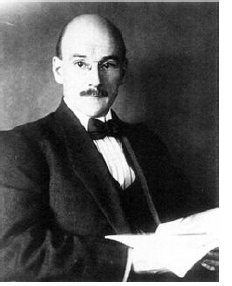In 1910, prominent American psychologist, Henry Goddard (1866–1957) gave a paper in which he proposed that intelligence could be measured and graded according to an ‘intelligence quotient’, or IQ. The idea of IQ was based on Alfred Binet’s concept of mental age, in which the IQ score is calculated by dividing mental age (the average result for children of that age) by age in years and multiplying that by 100. For example, a 10-year-old whose IQ test score was as good as the average result for 12 year olds would have an IQ score of 12/10 x 100 = 120. He created a number of categories for the classification of mental retardation: a moron had an IQ of 51 to 70; an imbecile an IQ of 26–50 and an idiot an IQ of 0–25. In 1913, Goddard was involved in the introduction of IQ tests for immigrants passing into the United States through Ellis Island, which resulted in a large number of immigrants being deported. Goddard explains the distinction between knowledge and intelligence, which he used for the development of the IQ test:

Many a person is estimated as of high intelligence who in reality has only a somewhat unusual supply of knowledge. The extreme of this is familiar in the man who, as it is commonly expressed, ‘is a walking encyclopedia’ but who makes almost no use of his knowledge for the usually unappreciated reason that he has not the natural intelligence necessary …
Skepticism in regards to the validity of tests is the result largely of a confusion of intelligence with knowledge. One constantly hears the objection that such a child has not had an opportunity to learn certain things. If the question is one that depends upon the acquisition of knowledge then it is not a suitable test of intelligence. While it is probable that no measuring scale so far devised entirely gets away from more or less influence of knowledge and education, yet the questions are so arranged that on the whole it has very little influence …
[E]very human being reaches at some time a level of intelligence beyond which he never goes … [T]hese levels range from the lowest or idiotic, to the highest level of genius. [T]he number of people of relatively low intelligence is vastly greater than is generally appreciated and that this mass of low level intelligence is an enormous menace to democracy unless it is recognized and properly treated … [The S]ocial efficiency of a group of human beings depends upon recognizing the mental limitations of each one and of so organizing society that each person has work to do that is within his mental capacity and at the same time calls for all the ability that he possesses … [T]he failure to appreciate this fact and control it, has resulted in a vast amount of delinquency, and that such delinquency impairs the efficiency of the total group to an extent little appreciated … [T]he intelligent group must do the planning and organizing for the mass, that our whole attitude toward lower grades of intelligence must be philanthropic; not the hit and miss philanthropy with which we are all too familiar but the philanthropy based upon an intelligent understanding of the mental capacity of each individual.
Here are 15 test questions taken from Goddard’s army examination:
- How many are 30 men and 7 men?
- Are cats useful animals because they catch mice, or because they are gentle, or because they are afraid of dogs?
- Is leather used for shoes because it is produced in all countries, or because it wears well, or because it is an animal product?
- Do these two words mean the same or opposite: wet—dry?
- Do these two words mean the same or opposite: in—out?
- Do these two words mean the same or opposite: hill—valley?
- Re-arrange these groups of words into a sentence and tell whether it is a true or false statement. lions strong are.
- houses people in live.
- days there in are week eight a.
- leg flies one have only
- Write the next two numbers in this series: 3, 4, 5, 6, 7, 8.
- In this series: 15, 20, 25, 30, 35.
- In this series: 8, 7, 6, 5, 4, 3.
-
From the four words in heavy type select one that is related to the third word in italics as the second is to the first;
gun—shoots :: knife—run cuts hat bird.
ear—hear :: eye—table hand see play.
Goddard, Henry H. 1920. Human Efficiency and Levels of Intelligence. Princeton NJ: Princeton University Press. pp. 8, 12, 19–20, 127–128. || WorldCat
